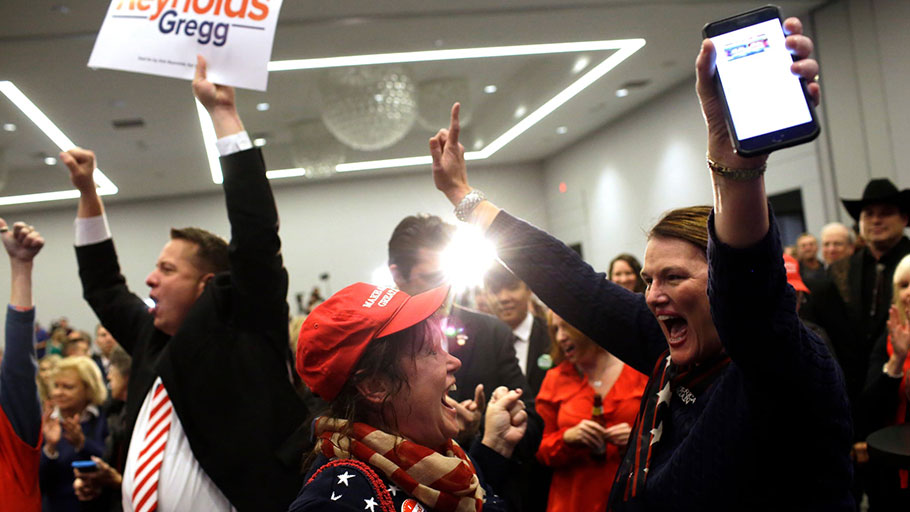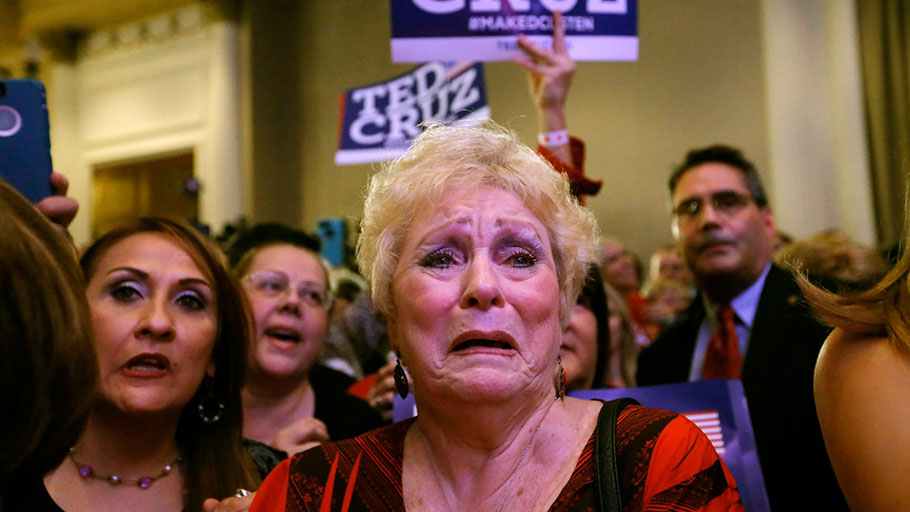Supporters of Ted Cruz react at his midterm election night party in Houston. Photograph: Cathal McNaughton/Reuters
Democrats hoped for a huge rejection of Trumpism, but found two forces still hold an intoxicating political power.
By Andrew Gawthorpe, The Guardian —
The expectations we carry into elections always make it difficult to objectively assess their outcome. Before the midterms, Democrats hoped for a blue wave that would decisively hand them the House and perhaps more, while Donald Trump was poised to declare victory whatever the outcome. The morning after, the results looked mixed, with neither side able to claim a sweeping victory. How, then, should we understand what happened?
Most importantly of all, the Democrats took control of the House. They won the popular vote and, for the first time since 2008, independent voters – who aren’t affiliated with either party – backed the Democrats, and by a sizable margin. Democrats also won important Senate and gubernatorial races in states that will be key to beating Donald Trump in 2020, such as Michigan, Pennsylvania, and Wisconsin.
Democratic control of the House should finally see the legislative branch emerge as the check and balance on the executive which the constitution intends it to be. The Trump administration will no longer get a free ride from Congressional Republicans who had no interest in shining a light on its abuses of power. Key committees will also pass into Democratic control. The House intelligence committee, which Republicans have used to harass law enforcement officials investigating Trump and his associates, will now have a Democrat as its chair.
The trailblazing candidates who have broken barriers in the midterms – video
That the Democrats have not won an even larger share of seats in Congress is largely due to gerrymandering, which gives Republicans a built-in advantage in the House. But in the long term, last night’s results will also help to restore fairness to American democracy. Florida overturned a Jim Crow-era voting ban affecting 1.4 million felons, including nearly 25% of the state’s African American adults – the greatest expansion of voting rights since the civil rights era. Meanwhile, key state-level wins will give Democrats the chance to redraw districts and undo gerrymandering.
Yet the elections were not the stunning repudiation of Trump and the Republican party that many liberals, profoundly disturbed by the nation’s trajectory, had hoped for. A party that has ripped children from their parents at the border and put them in cages, has stolen a majority on the supreme court, and has looked the other way as nepotism, authoritarianism and chaos have taken up residence in the White House hardly suffered a catastrophic night. It avoided a complete rout in the House, made gains in the Senate, and won important governorships in Ohio and Florida.

Republican supporters cheer after Iowa’s Republican candidate for governor won re-election. Photograph: Joshua Lott/Getty Images
That it managed to do this is down to two factors that continue to deliver votes into the Republican column. The first is the power of partisanship, and the second is the power of whiteness. According to an exit poll by CNN, fully 94% of Republicans voted for Republican House candidates. Meanwhile, white voters went for Trump by a 10% margin. Among older whites and whites without a college degree (often a proxy for conservative racial attitudes), the margins were even starker.
These figures show that the thorough rejection of Trumpism that the Democrats have been hoping for – and which might convince his party to change course – has not arrived and is not likely to arrive soon. Trump’s coalition has eroded somewhat, but it will be clear to both the president and party strategists that Republican partisanship and white identity politics are still intoxicating political forces.
Most worryingly of all, the voters they motivate seem impervious to recognizing – or simply do not care about – the broader threat to American values and democracy that the Republican party of today represents. After everything it and its leader have done in the past two years, it seems hard to imagine what it might do in the next that will finally cause a rift with its adherents.
“This is not normal” has become a catchphrase for those outraged by the Trump administration’s daily affronts to human decency, the rule of law, and good governance. But it looks increasingly like the American politics of the last two years is the new normal. For so long as Republican voters continue to treat Trump and his party as normal political forces to whom the ordinary rules of partisanship should apply, as opposed to outliers who pose an existential threat to the American system of government, change cannot come. Partisanship even makes accountability before the rule of law controversial – exit polls showed that 54% of voters, including 73% of Republicans, view the Mueller investigation as politically motivated.
Given that the Republican party failed to receive a stunning repudiation that might force it to change course, it seems inevitable that it will instead double down, using the power of partisanship and whiteness to cover its sins and consolidate its base. The message of the midterms is hence not only that 2020 remains competitive. It is that a much deeper problem, the continued march of one of the nation’s political parties away from America’s ideals and towards its darkest impulses, remains no closer to being solved.















